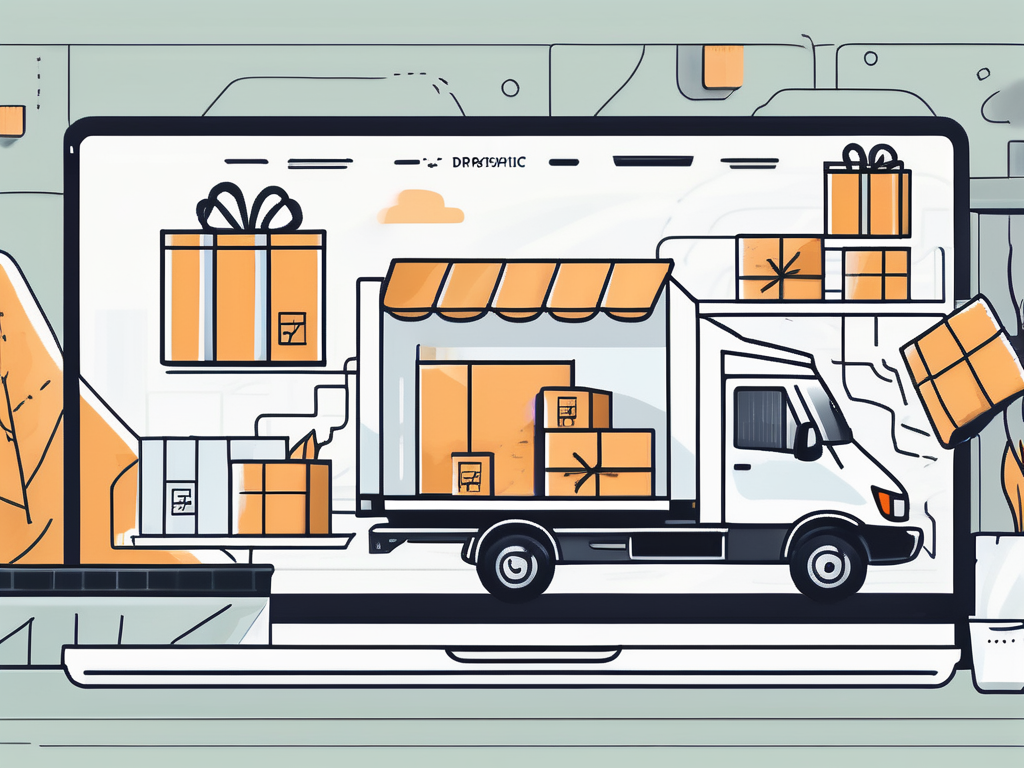In this comprehensive guide, we will delve into the world of Shopify dropshipping and reveal the secrets to finding reliable suppliers. Whether you are a seasoned entrepreneur or just starting your e-commerce journey, this guide will provide you with all the information you need to succeed.
Understanding Shopify Dropshipping
Before we dive into the process of finding dropshipping suppliers, it’s important to understand what Shopify dropshipping is all about. In a nutshell, Shopify dropshipping is a business model where you can sell products without having to keep any inventory. Instead, you work with suppliers who will fulfill your orders on your behalf.
What is Shopify Dropshipping?
Shopify dropshipping allows you to set up an online store and sell products to customers. The major advantage of this business model is that you don’t need to worry about stocking or shipping products. Instead, your supplier takes care of these tasks, allowing you to focus on marketing and growing your business.
Benefits of Shopify Dropshipping
There are numerous benefits to choosing Shopify dropshipping as your business model. Firstly, it allows you to start an e-commerce business with minimal upfront investment. Unlike a traditional retail business, you don’t need to purchase inventory upfront, saving you huge amounts of money.
But let’s dive deeper into the benefits of Shopify dropshipping. One of the key advantages is the low risk involved. Since you don’t have to invest in inventory, you can test different products and niches without the fear of losing money on unsold items. This gives you the freedom to experiment and find the perfect products that resonate with your target audience.
Another benefit is the flexibility and scalability of the Shopify dropshipping model. As your business grows, it’s easy to add new products to your store and test different markets. This flexibility allows you to adapt and respond to changing consumer trends, giving you a competitive edge in the market.
Identifying Your Dropshipping Niche
One crucial step in finding the right dropshipping suppliers is identifying your niche. Choosing a niche that aligns with your interests, expertise, and market demand is key to your dropshipping success.

Importance of Choosing the Right Niche
Choosing the right niche is vital because it determines the direction of your dropshipping business. A well-chosen niche allows you to connect with your target audience, build a strong brand, and establish yourself as an expert in your industry. It also helps you differentiate yourself from competitors and attract loyal customers.
Tips for Selecting a Profitable Niche
When selecting a profitable niche, consider factors such as market demand, competition level, and profit potential. Conduct thorough market research to identify niches with untapped opportunities and high-profit margins. Leverage tools like Google Trends, keyword research, and competitor analysis to gain insights into market trends and consumer behavior.
Market demand is a crucial aspect to consider when choosing your dropshipping niche. You want to ensure that there is a sufficient number of potential customers who are interested in the products you plan to sell. Conducting thorough market research will help you identify the current demand for your chosen niche and whether it is expected to grow in the future.
Additionally, analyzing the competition level in your chosen niche is essential. While competition can indicate a healthy market, too much competition can make it challenging to stand out and attract customers. Look for niches with a balance of competition, where you can offer unique products or provide a better customer experience than your competitors.
Profit potential is another critical factor to consider. Look for niches with high-profit margins, as this will directly impact your dropshipping business’s profitability. Consider the cost of sourcing products, shipping fees, and any other expenses associated with running your business. By choosing a niche with high-profit potential, you can maximize your earnings and achieve long-term success.
How to Find Reliable Dropshipping Suppliers
Finding reliable dropshipping suppliers is crucial for the success of your Shopify dropshipping business. Your suppliers’ reliability, product quality, and timely shipping directly impact your customers’ satisfaction and your brand reputation.
When searching for dropshipping suppliers, it’s important to consider a few key factors. Firstly, a good dropshipping supplier exhibits certain characteristics that set them apart from unreliable suppliers. Look for suppliers who have a solid track record, positive reviews, and a wide range of high-quality products. This will give you confidence in their ability to fulfill orders efficiently and provide your customers with top-notch products.
Another important characteristic to look for in a dropshipping supplier is their order fulfillment system. A supplier with an efficient order fulfillment system will ensure that your customers receive their orders in a timely manner, which is crucial for maintaining customer satisfaction. Additionally, excellent customer service is essential for a smooth dropshipping experience. A supplier who is responsive and helpful when it comes to addressing any issues or concerns will greatly contribute to the success of your business.
Red Flags to Avoid in Dropshipping Suppliers
While it’s important to know what to look for in a reliable dropshipping supplier, it’s equally important to be aware of red flags that may indicate an unreliable supplier. One red flag to watch out for is inconsistent communication. If a supplier takes a long time to respond to your inquiries or fails to provide clear and concise information, it may be a sign that they are not reliable.
Unreliable inventory management is another red flag to avoid. If a supplier frequently runs out of stock or has difficulty keeping track of their inventory, it can lead to delays and frustration for both you and your customers. Poor product quality is also a major concern. Your customers expect to receive high-quality products, and if a supplier consistently delivers subpar items, it can damage your brand reputation and lead to negative reviews.
Lastly, be cautious of suppliers who charge excessive fees or impose strict minimum order quantities. These practices can eat into your profit margins and make it difficult for you to run a successful dropshipping business. Additionally, suppliers with a history of shipping delays should be approached with caution, as this can result in dissatisfied customers and potential loss of sales.
By being aware of these red flags and focusing on finding suppliers with positive characteristics, you can ensure that you partner with reliable dropshipping suppliers who will contribute to the success of your Shopify dropshipping business.
Evaluating Dropshipping Suppliers
Once you’ve found potential dropshipping suppliers, it’s essential to evaluate them thoroughly. Taking the time to assess their suitability helps you make informed decisions and build strong partnerships that benefit your business in the long run.

When evaluating dropshipping suppliers, consider factors such as product quality, pricing, shipping methods, and order processing time. Assess their inventory management systems, return policies, and responsiveness to ensure they align with your business requirements and customers’ expectations.
Product quality is a crucial aspect to evaluate when choosing a dropshipping supplier. You want to ensure that the products your customers receive are of high quality and meet their expectations. Look for suppliers who have a reputation for providing top-notch products and who are willing to provide samples for you to assess the quality firsthand.
Pricing is another critical factor to consider. While you want to find suppliers who offer competitive prices, it’s important to strike a balance between affordability and quality. Remember, your profit margins depend on the pricing you negotiate with your suppliers, so take the time to compare prices from different suppliers and negotiate for the best possible deal.
Negotiating Terms with Suppliers
Negotiating terms with your suppliers is an essential step in building a successful dropshipping business. Discussing pricing, minimum order quantities, shipping arrangements, and payment terms enables you to establish mutually beneficial partnerships. Focus on building strong relationships with your suppliers to secure competitive pricing, priority access to new products, and efficient order fulfillment.
When negotiating pricing with your suppliers, it’s crucial to demonstrate the value you bring to the table. Highlight your marketing strategies, target audience, and projected sales volume to show suppliers that partnering with you will be mutually beneficial. This approach can help you secure better pricing and favorable terms.
Additionally, consider discussing minimum order quantities with your suppliers. While some suppliers may have strict minimum order requirements, others may be flexible, especially if you can show that you have a consistent and growing customer base. Negotiating lower minimum order quantities can help you manage your inventory more effectively and reduce the risk of holding excess stock.
Shipping arrangements and payment terms are also important aspects to discuss with your suppliers. Ensure that their shipping methods align with your customers’ expectations in terms of delivery time and cost. It’s also crucial to establish clear payment terms to avoid any misunderstandings or delays in processing payments.
By carefully evaluating potential dropshipping suppliers and negotiating favorable terms, you can establish strong partnerships that contribute to the long-term success of your dropshipping business. Remember, building relationships based on trust and mutual benefit is key to thriving in the competitive world of dropshipping.
Integrating Suppliers with Your Shopify Store
Now that you have identified reliable dropshipping suppliers, it’s time to integrate them with your Shopify store. This integration streamlines your operations, allowing you to efficiently manage inventory, handle orders, and provide a seamless shopping experience to your customers.

How to Connect Suppliers to Your Shopify Store
Connecting your suppliers to your Shopify store involves setting up dropshipping apps or plugins that facilitate order synchronization and automatic inventory updates. Explore apps such as Oberlo, Spocket, or Modalyst, and follow their user-friendly guides to connect your suppliers and sync product listings effortlessly.
Managing Inventory and Orders with Suppliers
Efficiently managing inventory and orders with your suppliers is crucial for maintaining customer satisfaction. Regularly communicate with your suppliers to ensure accurate inventory levels and timely order fulfillment. Keep a close eye on your store’s analytics to identify popular products or potential supply chain issues that may require adjustments to your inventory management strategy.
By following this ultimate guide, you are well-equipped to find and work with reliable dropshipping suppliers for your Shopify store. Remember, continuous learning, adaptability, and building strong relationships are key to long-term success in the world of Shopify dropshipping. Now, it’s time to take action and start building your empire!


